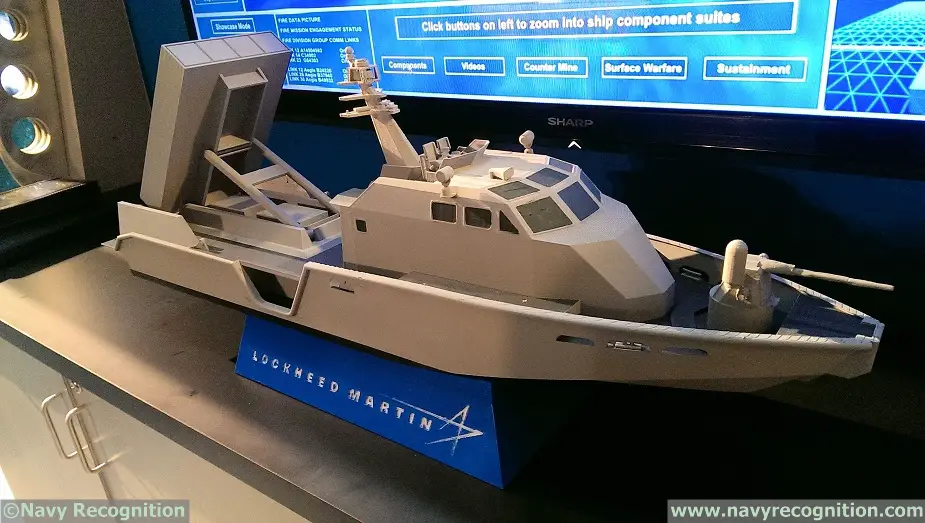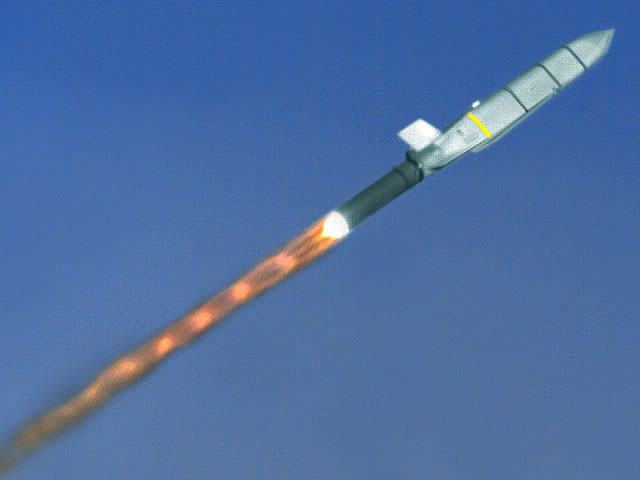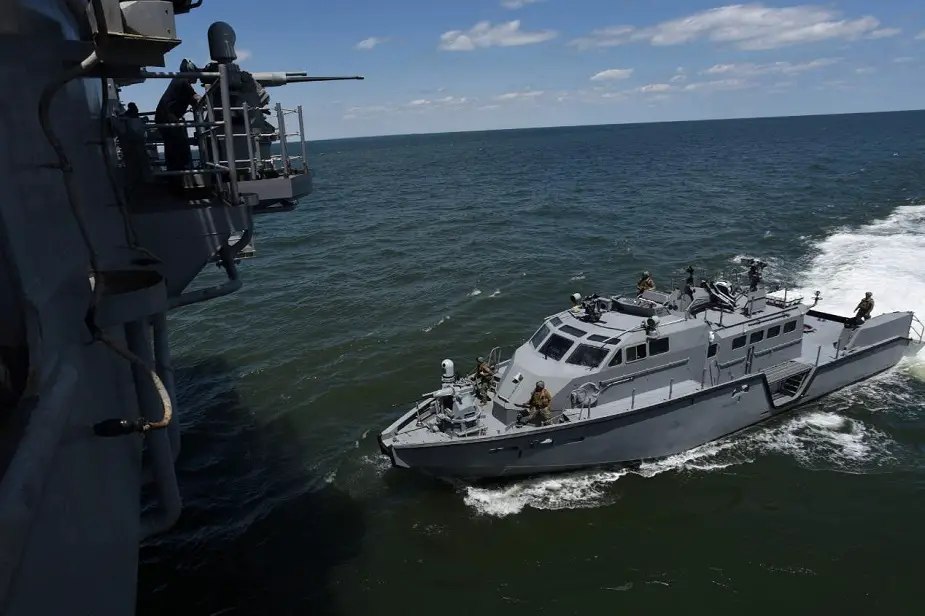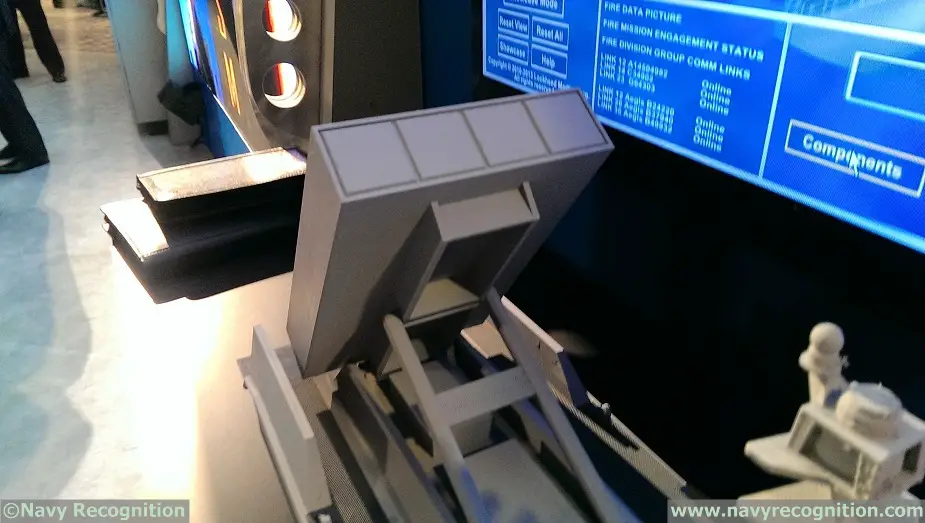Breaking news
Lockheed Martin Studying Integration of LRASM Anti-Ship Missile on USV Platforms.
At the Surface Navy Association's (SNA) 2017 National Symposium held last year, Lockheed Martin was showcasing a Mark VI patrol boat scale model fitted with an erectable launcher for four missiles at its stern. This conceptual model was representative of an unmanned Mark VI patrol boat fitted with LRASM next generation anti ship missiles.
 Conceptual scale model of a Mark VI fitted with 4x LRASM anti-ship missiles on Lockheed Martin stand at SNA 2017
Conceptual scale model of a Mark VI fitted with 4x LRASM anti-ship missiles on Lockheed Martin stand at SNA 2017
Lockheed Martin representatives told Navy Recognition at the time (SNA 2017), that the Pentagon’s Strategic Capabilities Office (SCO) awarded Lockheed Martin a contract to study the integration of AGM-158C LRASM on unmanned surface vehicles (USV). The idea would be to pre-position the USVs in strategic areas such as straits and bays. The key benefit would come from combining the endurance, survivability of the USV (its small size making it harder to detect) to the performance of the LRASM (range in excess of 200 nautical miles).
At SNA 2018 all we learned is that studies are ongoing. No one at Lockheed Martin could answer our questions. It wouldn't be surprising however if a bigger platform is being considered for this application. Displacing just 85 tons, the Mark VI patrol boat has a payload capacity of 5,000 Kg. A missile expert (who wished to remain unnamed) informed us that a LRASM missile alone weighs about 1,150 Kg (this seems to be corroborated by a Breaking Defense article mentioning a weight of 2,500 lbs or 1,133 Kg). The same missile expert explained that a "ready to fire" LRASM is probably closer to 2,000 Kg taking into account the large booster (similar to the one used for the RUM-139 VL-ASROC) and the launching system. Fitting four of those missiles at the stern of a Mark VI patrol boat seems like an impossible task (even with the pilothouse and crew accommodation removed which would likely be the case for a USV-configured Mark VI). In addition to increased payload capacity, a larger USV would offer greater range, endurance and therefore persistence. LRASM could likely be launched from BAE Systems' Adaptable Deck Launcher (ADL) fitted on a larger USV. This launcher would be less complex to operate and to integrate than an erectable one. ADL was unveiled at SNA 2018, follow this link to learn more about it.
 Successful boosted test vehicle flight demonstrating LRASM missile egress, flight with existing Mk-114 ASROC booster. Lockheed Martin file picture (2014).
Successful boosted test vehicle flight demonstrating LRASM missile egress, flight with existing Mk-114 ASROC booster. Lockheed Martin file picture (2014).
About LRASM
LRASM is a next-generation, precision-guided stealth missile capable of semi-autonomously detecting and identifying targeted enemy ships. The precision routing and guidance technology of the sensor - which doesn’t rely exclusively on intelligence, surveillance, and reconnaissance systems, networking links, or GPS navigation - enables the missile to operate effectively in contested domains and all weather conditions, day or night.
LRASM is designed to detect and destroy specific targets within groups of ships by employing advanced technologies that reduce dependence on intelligence, surveillance and reconnaissance platforms, network links and GPS navigation in electronic warfare environments. LRASM will play a significant role in ensuring military access to operate in open ocean/blue waters, owing to its enhanced ability to discriminate and conduct tactical engagements from extended ranges.
LRASM is based on the successful Joint Air-to-Surface Standoff Missile - Extended Range (JASSM-ER). It is designed to meet the needs of U.S. Navy and Air Force warfighters in contested environments. The air-launched variant provides an early operational capability for the U.S. Navy’s offensive anti-surface warfare Increment I requirement to be integrated onboard the U.S. Air Force’s B-1B in 2018 and on the U.S. Navy’s F/A-18E/F Super Hornet in 2019. Lockheed Martin a surface-launch variant of LRASM from a topside canister in July 2017.
 Coastal Riverine Squadron Four (CRS-4) conducting well deck operations with the Mark VI patrol boat aboard amphibious assault ship USS Bataan (LHD 5). US Navy picture.
Coastal Riverine Squadron Four (CRS-4) conducting well deck operations with the Mark VI patrol boat aboard amphibious assault ship USS Bataan (LHD 5). US Navy picture.
About the Mark VI patrol boat (PB)
The MK VI is a next generation PB and the latest addition to the US Navy fleet of PB. The 85 foot combatant craft’s hull is optimized for performance, fuel economy and firepower. The MK VI PB is configured with both an ergonomically designed pilothouse seating 5 operators: The Engineer (taking care of the engines and Mk 38 turret), the Navigator, the coxswain, the communication engineer and the boat Captain.
The MK VI PB has a range of 600 nautical miles and is fitted with two MTU 16V2000 M94 engines and two Hamilton HM651 waterjets.
The MK VI PB can be deployed from US Navy LPD 17 and LHDs: To do so, it is fitted with two kick stands at the stern to stabilize it in the well deck.
SAFE Boats International in Tacoma, Washington state was awarded a contract to provide the US Navy with 6 MK VI PBs in May 2012 with an another contract for 4 more boats awarded in July 2014. The U.S. Navy Coastal Riverine Group 2 has taken ownership of the first two Mark VI in September 2015.
 Close up view of the LRASM erectable launcher of the Mark VI patrol boat scale model
Close up view of the LRASM erectable launcher of the Mark VI patrol boat scale model
About the SCO
Established by Secretary Ashton Carter in 2012, the SCO imagines new—often unexpected and game-changing—uses of existing government and commercial systems: extending their shelf-life and restoring surprise to the military’s playbook. In addition to warfare strategies, SCO also analyzes options for revealing capabilities prior to conflict to increase doubt, impose cost, or maintain deterrence against potential adversaries.


























